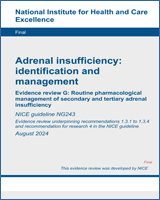From: Routine pharmacological management of secondary and tertiary adrenal insufficiency

NCBI Bookshelf. A service of the National Library of Medicine, National Institutes of Health.
| Outcomes | № of participants (studies) Follow-up | Certainty of the evidence (GRADE) | Relative effect (95% CI) | Anticipated absolute effects | |
|---|---|---|---|---|---|
| Risk with Dose B [10mg/5mg/5mg HC] | Risk difference with Dose A [10mg/5mg HC] | ||||
|
SF-36 - Physical sum scale Scale from: 0 to 100 follow-up: 4 weeks (higher is better) |
18 (1 RCT) |
⨁◯◯◯ | - | The mean SF-36 - Physical sum scale was 40.7 points |
MD 3.2 points higher (4.66 lower to 11.06 higher) |
|
SF-36 - Psychological sum scale Scale from: 0 to 100 follow-up: 4 weeks (higher is better) |
18 (1 RCT) |
⨁◯◯◯ | - | The mean SF-36 - Psychological sum scale was 46.4 points |
MD 0.1 points lower (7 lower to 6.8 higher) |
|
BSI Global Severity Index Scale from: 0 to 100 follow-up: 4 weeks (lower is better) |
18 (1 RCT) |
⨁◯◯◯ | - | The mean BSI Global Severity Index was 58.1 points |
MD 0.2 points lower (8.15 lower to 7.75 higher) |
|
Satisfaction with medication assessed with: 100 mm visual analog scale Scale from: 0 to 100 follow-up: 4 weeks (lower is better) |
18 (1 RCT) |
⨁◯◯◯ | - | The mean satisfaction with medication was 56.6 points |
MD 5.4 points lower (25.22 lower to 14.42 higher) |
|
Sleepiness score 0700 assessed with: Stanford Sleepiness Scale Scale from: 0 to 7 follow-up: 4 weeks (lower is better) |
18 (1 RCT) |
⨁◯◯◯ | - | The mean sleepiness score 0700 was 2.3 points |
MD 0.2 points higher (0.02 lower to 0.42 higher) |
|
Sleepiness score 1200 assessed with: Stanford Sleepiness Scale Scale from: 0 to 7 follow-up: 4 weeks (lower is better) |
18 (1 RCT) |
⨁◯◯◯ | - | The mean sleepiness score 1200 was 1.7 points |
MD 0 points (0.17 lower to 0.17 higher) |
|
Sleepiness score 1500 assessed with: Stanford Sleepiness Scale Scale from: 0 to 7 follow-up: 4 weeks (lower is better) |
18 (1 RCT) |
⨁◯◯◯ | - | The mean sleepiness score 1500 was 1.8 points |
MD 0 points (0.17 lower to 0.17 higher) |
|
Sleepiness score 1800 assessed with: Stanford Sleepiness Scale Scale from: 0 to 7 follow-up: 4 weeks (lower is better) |
18 (1 RCT) | - | The mean sleepiness score 1800 was 2.1 points |
MD 0.4 points lower (0.57 lower to 0.23 lower) | |
|
Sleepiness score 2200 assessed with: Stanford Sleepiness Scale Scale from: 0 to 7 follow-up: 4 weeks (lower is better) |
18 (1 RCT) | - | The mean sleepiness score 2200 was 3.4 points |
MD 0.7 points lower (0.99 lower to 0.41 lower) | |
Explanations
Downgraded by 2 increments for risk of bias (potential for measurement bias in patient-reported outcome, little information provided on deviations from intended interventions).
Downgraded by 2 increments as confidence interval crossed both MIDs (+/− 2)
Downgraded by 2 increments as confidence interval crossed both MIDs (+/− 3)
Downgraded by 2 increments as confidence interval crossed both MIDs (+/− 6.45)
Downgraded by 2 increments as confidence interval crossed both MIDs (+/− 13.65)
Downgraded by 1 increment as confidence interval crossed 1 MID (+/− 0.16)
Downgraded by 2 increments as confidence interval crossed both MIDs (+/− 0.145)
Downgraded by 2 increments as confidence interval crossed both MIDs (+/− 0.12)
no imprecision MID (+/− 0.15)
no imprecision MID (+/− 0.25)
From: Routine pharmacological management of secondary and tertiary adrenal insufficiency

NCBI Bookshelf. A service of the National Library of Medicine, National Institutes of Health.